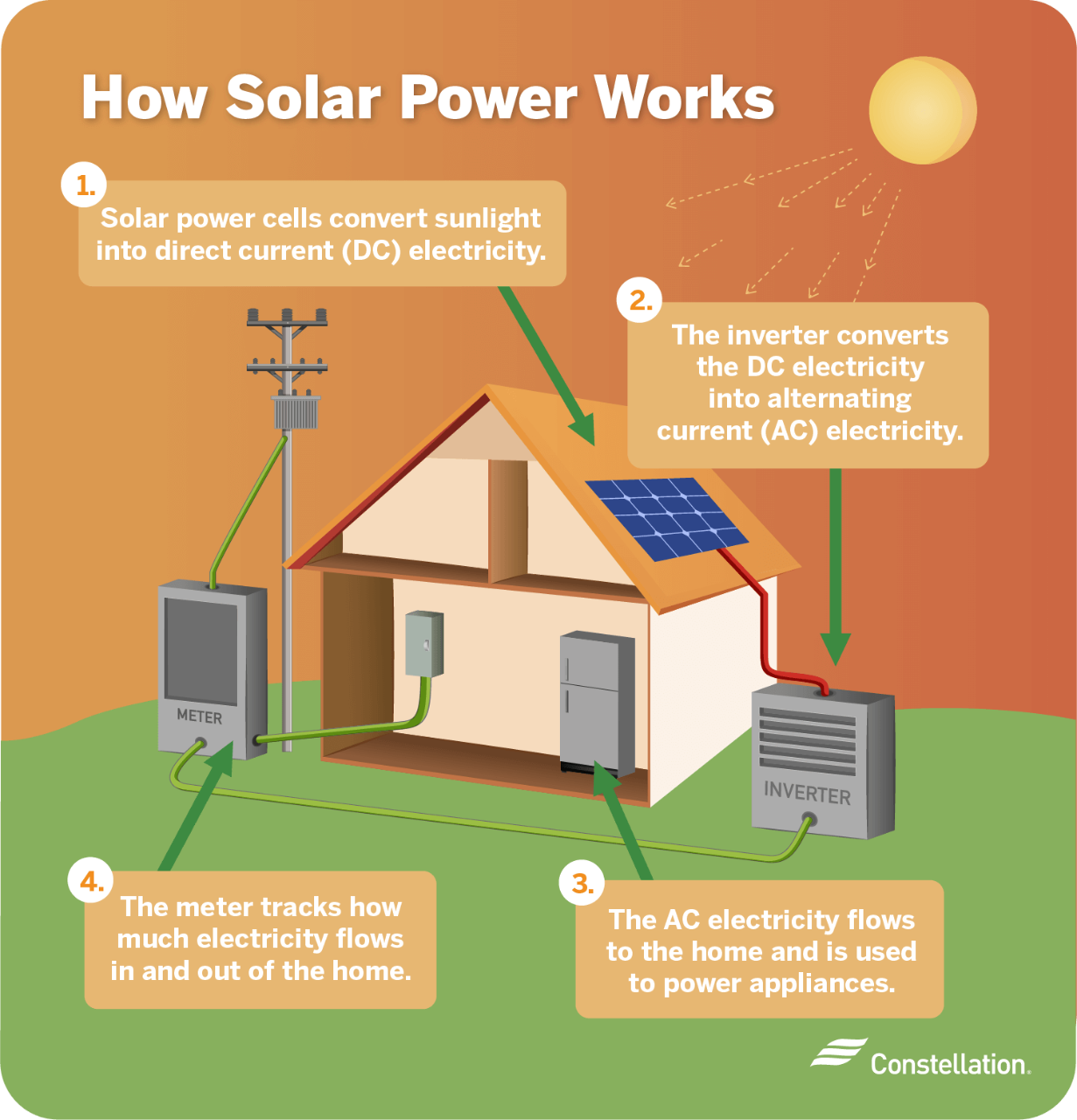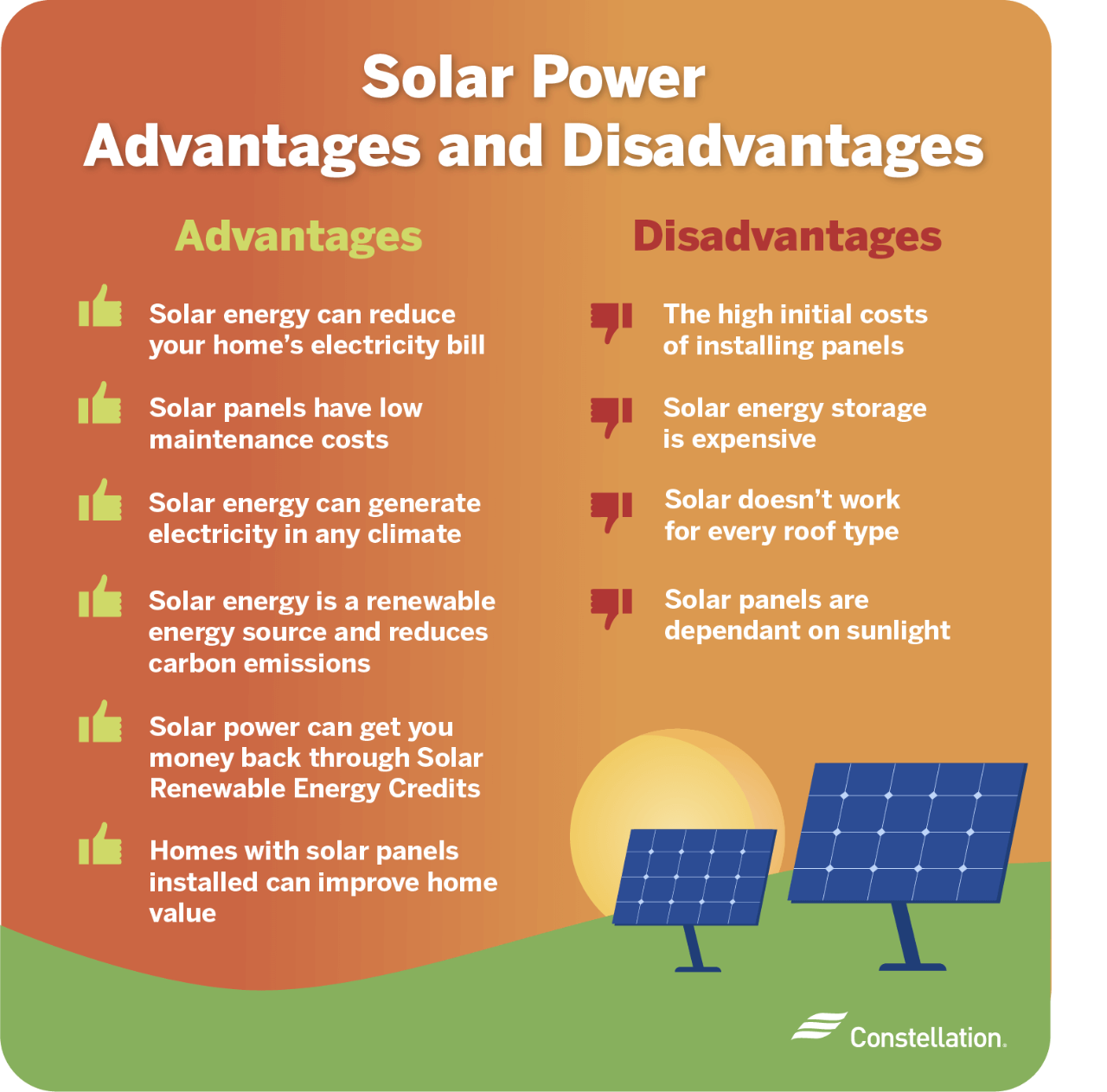The Advantages and Disadvantages of Solar Energy
- Home Page
- Energy 101: Resources to Help Understand Energy
- Energy Innovation
- The Advantages and Disadvantages of Solar Energy
Solar energy pros and cons are a hot topic today. As the earth’s most plentiful source of energy, the sun holds enormous promise as a clean and dependable way to power our world.
When the radiant energy of the sun is converted to heat and electricity, it can provide energy to residences and businesses, and even power vehicles.
Now might be a good time to learn about solar energy advantages and explore adding a solar energy system to your home. Then you can decide: Is solar energy worth it?
When considering home energy options, it is important to understand how solar energy works. When sunlight hits a solar panel, a photovoltaic cell turns that light into direct current (DC) electricity. An inverter then converts it to alternating current (AC), which is what most devices in your home use.

Advantages of Solar Energy
The more we can capture the benefits of solar energy, the less we will rely on fossil fuels. Adding a solar energy system to your home allows you to tap into these solar energy advantages:
1. Solar energy is a renewable energy source and reduces carbon emissions
Solar energy is a renewable energy source, meaning you don’t ever use it up. Solar energy is clean. It creates no carbon emissions or other heat-trapping “greenhouse” gases. It avoids the environmental damage associated with mining or drilling for fossil fuels. Furthermore, solar energy also uses little to no water, unlike power plants that generate electricity using steam turbines.
2. Solar energy can reduce your home’s electricity bill
A solar energy system for your home can reduce your reliance on the grid and help you save on your electricity bill. Some owners of residential solar energy systems may even have excess power that they can sell to the utility. Instead of paying a utility for electricity, homeowners get paid by the utility. You may not have to buy an entire solar energy system to cut your home’s electricity bill. Simply choose solar lights, lights that are powered by the sun instead of your home’s electrical system, to help save money.
3. Solar power can get you money back through Solar Renewable Energy Credits (SRECs)
Some states offer solar renewable energy certificates (SREC). Each one represents a megawatt-hour of electricity generated through solar energy. Electricity suppliers buy these certificates to satisfy their state’s Renewable Portfolio Standard, a requirement that a certain amount of their renewable energy come from solar. You can sell SRECs for your system's output, which is another way to earn money from your investment.
4. Homes with solar panels installed may improve home value
Home buyers will likely pay more for a house with solar panels installed. Considering solar energy pros and cons, the savings on electricity bills and the money earned selling power back to the utility, all count in the plus column. Residential solar energy systems are highly valued and can increase a home's resale value. The property value of a home with solar panels can be worth up to $15,000 more than its neighbors.
Solar systems are fairly easy to install and require very little maintenance. Both are handled by your solar provider, if you opt for a solar lease or power purchase agreement (PPA). Consider this as you ask yourself is solar energy worth it.
5. Solar panels have low maintenance costs
Solar panels are easy to maintain, as they have no moving parts that wear out over time. Just keep them clean and in good physical condition to keep them working properly. Between their low maintenance costs and average lifespan of 25 years, it can be easy to get your money’s worth when investing in solar panels.
6. Solar energy can generate electricity in any climate
Solar energy systems can generate electricity in any climate. One of the disadvantages of solar energy is that it’s subject to temporary weather disruption. Cloudy days reduce the amount of electricity you produce. Cold, however, doesn’t affect productivity. Snowfall can actually help your solar system, as the snow cleans the panels as it melts and sun reflected off the snow increases the amount of light hitting your panels. The result is more electricity production.

Disadvantages of Solar Energy
The disadvantages of solar energy are becoming fewer as the industry advances and grows, creating economies of scale. Technological advances are helping solar go mainstream. Here are how the disadvantages of solar energy and the pros and cons stack up.
1. The high initial costs of installing panels
The most commonly cited solar energy disadvantage, cost, is declining as the industry expands. The initial cost to buy and install the equipment is not cheap. Still, if cost is an issue, leasing options may reduce the amount of your initial outlay. If you do choose to buy, you will need to live in your home for a number of years before the system pays for itself. It’s a long-term investment better suited to property owners than renters.
2. Solar energy storage is expensive
Of the disadvantages of solar energy, the temporary decline in energy production during bad weather has been a major issue. Days with low solar energy, however, are having less of an effect due to advances in battery technology. Old technology for storing solar energy, like lead acid batteries are being replaced by alternatives. Lithium ion batteries offer greater power at a lower cost. Nickel-based batteries have an extremely long life. New technologies, like flow batteries, promise scale and durable power storage.
3. Solar doesn’t work for every roof type
Not every room will work well with solar panels. Orientation matters. If your roof doesn't face the sun, you won’t be able to capture enough solar energy. Roofs that angle into the sun tend to work better than flat roofs.
Roofing materials like asphalt shingles, metal and tiles make installing solar panels easier. If your room is made with other materials, installation may be more expensive. Part of what makes energy-efficient roofs is their ability to support solar panels.
4. Solar panels are dependent on sunlight
It’s obvious that solar panels need sunlight to generate electricity. They won’t produce electricity at night when you need it for light and they can be inefficient during storms and gloomy days. Your solar energy system needs batteries if you plan to fully depend on solar energy to power your home.
Batteries are one of the more expensive components of your system. Unlike solar panels, they do wear out and need careful maintenance to lengthen their lives. Comparing wind power vs. solar power, wind will keep generating electricity at night and during storms, as long as there is enough wind. Many people use both in residential systems.
Constellation Energy and Solar Energy
When weighing the pros and cons of solar energy for your home, there are additional options worth considering. Community solar projects are a great way to get the advantages of solar energy without buying and maintaining a system yourself.
If your home and roof won’t support solar panels or if you don’t have enough money to invest in one, community solar might be your answer. With this option, you agree to participating in a program that allows you receive credits for every kWh generated by the solar facility. You get a credit on your electricity bill proportional to your percentage of ownership in the project’s energy.